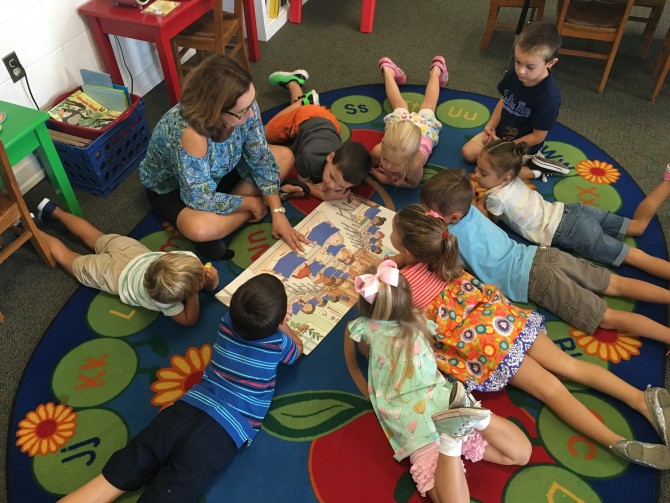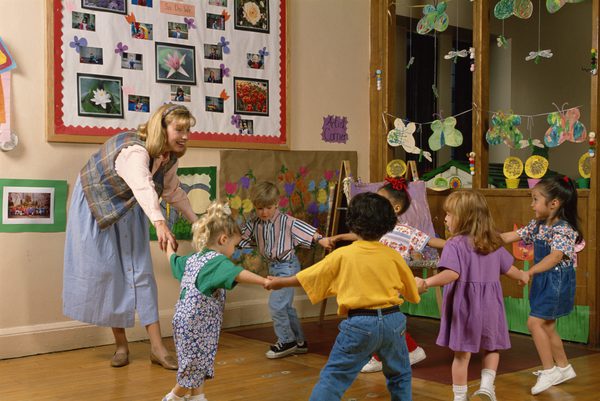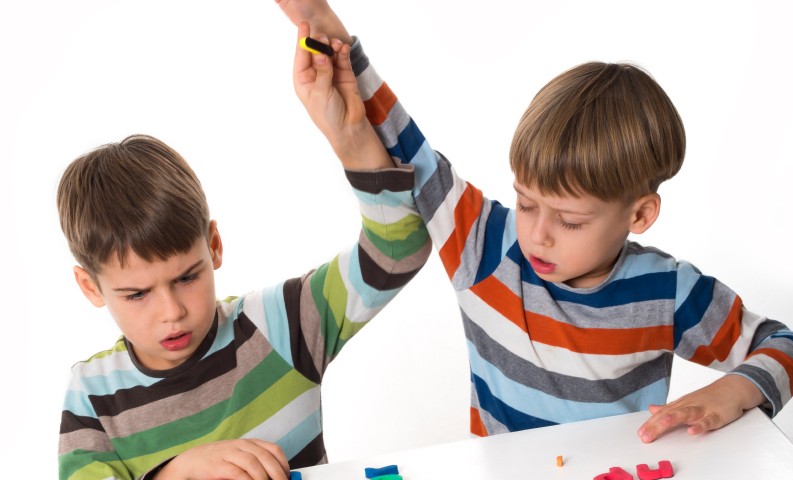Many parents who enrolled a child in kindergarten are in a joyful expectation. Now they will be able to calmly go to work, deal with accumulated matters. However, on the first day they are faced with a big problem. For some reason, the child does not want to go to the group, rests, cries. Parents are completely at a loss. They start to get nervous, think that something happened, probably they offend him, they got a bad teacher, angry children who fight or pick up toys. Mothers of toddlers are especially worried, because children cannot tell everything in detail.
Let's see together what happens in this period of a child’s life, when it ends, is it worth it to worry and take him home.
In the article, parents will receive answers to all questions of interest, as well as understand what the adaptation of the child in kindergarten is, how long it takes, how to help the baby cope with this difficult period of his life. We will say in advance that you don’t need to worry much, because absolutely all children go through this. First, let's look at what constitutes an adaptation process.
What is adaptation?
Adaptation is an adaptation to a new life, to changed external conditions. Remember your feelings when you first come to a new job, meet with a team of employees, bosses. Even in an adult, the first time there is excitement. Some adapt faster, while others make it harder. What can we say about the baby, who was pulled out of the usual habitat, from well-known, close people, and taken to a strange room, to an unfamiliar teacher. Do not forget that there are usually many children in a kindergarten, and such a number of peers can frighten a kid who is not used to noisy games.
Changes are also taking place in nutrition, treatment methods, adult requirements, and the need to establish relationships with peers.
As a result of a violation of the established rules of behavior, the formed habits, the child has negative reactions. Adaptation of a child in kindergarten may be accompanied by discontent, crying, tantrums, irritability, sleep disturbances can be observed during this period, in especially severe cases, even an increase in body temperature, disruption of the intestines. Consider the main causes that cause tears during adaptation.
Causes of Anxiety
- Adaptation to kindergarten for 2-3 year old children is associated with anxiety about the absence of a mother. After all, children are especially in dire need of constant care of a loved one, increased attention, not everyone can ask for help from someone else, even a friendly adult.
- Many children are heavily accustomed to discipline and strict observance of regimen moments. After all, a child’s house still has a lot of freedom. The personal mode of the baby is violated, and this causes discontent.
- New impressions, a large number of children cause excessive emotions, accompanied by sleep disturbance, increased excitability of the nervous system.
- It is more difficult for domestic children in terms of self-care. This greatly complicates the life of a child who is not used to eating, dressing, folding toys, doing something with his hands.
- The process of adapting children to kindergarten conditions may be complicated by the first negative impression. For example, a favorite toy was taken from the baby or they were not allowed to play the one that he liked.
- There was a misunderstanding with the adults around him. Rarely, but it happens when the teacher does not find contact with the child or the baby flatly refuses to communicate with a stranger.
The difference in behavior during adaptation
All children are different and it is impossible to predict in advance the behavior of the child in a given situation. There are sociable children, among the people they are called "gypsy child." They calmly make contact with strangers, love the company of other children, get to know each other quickly, try to please, love praise.
However, there is another option. When the kid spent time at home, mainly with his mother, he didn’t even want to stay with his grandmother for a couple of hours. The rest of the children ran wild, hiding behind the back of the mother from questions of strangers.
It is clear that such children will perceive the kindergarten negatively, and the period of addiction will take a long time. Psychologists distinguish several forms of adaptation of the child to kindergarten.
Easy adaptation
The first group includes children who, although not always willingly, go to kindergarten. Parents may observe small changes in behavior. The process of adaptation of a child in kindergarten takes place without frequent illnesses. This behavior is characteristic of most babies, especially the younger group. Initially, children with pleasure run to play with other children, consider new toys, children's bright furniture. Some even in the mornings are hard to say goodbye to their parents, but then quickly calm down and play with the children. The period of full adaptation to new conditions occurs during the first month. The body of the child does not experience serious stress and the immune system copes. Such kids are not prone to tantrums, sometimes there are light whimpers, little prolonged whims, for example, in the morning there are requirements - I want to take a steam train, my mother’s phone or go in an elegant dress.
Medium Adaptation
The second group of babies is characterized by a longer addiction to unusual conditions. Psychologists note minor nervous conditions, without tantrums. Adaptation of a child in kindergarten in a nursery group is accompanied by frequent morbidity. This is the so-called viral and bacterial adaptation. The behavior in the morning depends on the mood of the child. Sometimes she is sad and leaves her mother for a long time, there are days when she enters the group without crying, calmly.

But the main difference from the mild degree is hidden experiences, when the baby feels stress inside. At night, he can wake up in tears, spin, talk in a dream. Immunity is reduced, and the child begins to get sick often. However, being at home, recovery comes quickly, the disease is not accompanied by complications. The process of adaptation of children in the nursery group of kindergarten lasts up to two months. Then the child gets used to the new children, to the educators, finds a friend, takes an active part in the games.
Severe cases
These are quite rare cases that occur in a single copy in each group of kindergarten. The child absolutely does not want to contact with a stranger, it is impossible to entice him with anything - neither a beautiful toy, nor a hamster in a living corner. The morning begins with hysteria, along the way all the neighbors hear that the child is being taken to kindergarten. Staying in a group, the baby cries for a long time, sits apart, hides in a corner so that no one bothers him, does not want to eat or play. If the teacher tries to talk with him or engage in activities, he perceives everything negatively, begins to cry right away. It’s good if you come across an experienced teacher who can quickly find a common language with such a difficult child. He needs to pay special attention, hold him in his arms, and stand nearby for a walk. Then the baby will feel a sense of security and will get used to the teacher much faster. During this period, you need to consult a doctor about improving immunity, for example, take a complex of vitamins. This will help to avoid frequent illnesses and adaptation will be faster.
Parent Tips
Adaptation of the child in kindergarten will be much more successful if the parents carry out preparatory work. Be sure to tell the baby in advance what it is, why parents bring their children to kindergarten, where close people are at this time. Many children, even those who happily go to the garden in the mornings, anxiously ask their mother: "Will you come for me?" The fear remains that the child was left and will not come. Be sure to repeat many times that you love him and will come soon. In the evenings, you can come to the territory of the kindergarten and show the child the evening leaving of the children home. Late in the evening, walking nearby, pay attention to the child, how empty the institution is, nobody is gone, all the children went home.

Empty talk that there are a lot of children and toys will not at all reassure the child. He needs to truthfully explain the situation that adults need to go to work, earn money, and they are afraid to leave a small child in the apartment. Therefore, they came up with a special place where children are supervised by adults. In the evenings, the kindergarten closes, and parents take everyone home. Adaptation of the child in the kindergarten will be calmer if the parents bring the baby to the group in advance, introduce them to the teacher, you can come up during an evening walk and play a few evenings with the children in the presence of the parents. Then the child will not be so scared on his first working day, since he has already seen many children, he knows the teacher.
Parenting Mistakes
Some mothers are completely unprepared for the first day of visiting the kindergarten, they are very surprised that their child is behaving this way, for some reason he suddenly cries, does not want to play with the children. Their anxiety is transmitted to the child. Adaptation of the child in kindergarten will be easier if the parents carry out preparatory work and, most importantly, will be ready for the baby’s possible reaction. If you are very worried about how a child behaves without you, then it is best to use mobile communications and ask the educator about this personally.

The next mistake of parents is the fact that they do not take into account the adaptation of the child in kindergarten. You can give the following advice to parents: do not plan to immediately get a job or start important things. It takes several months for the child to get used to the new living conditions. At first, it will be necessary to pick it up early, and at the beginning of the visit, the kids will be sick.
Another mistake is a discussion in the presence of a family of educators, expressing concern that a child is crying in the morning, and the child should not be blamed for his tears. This will only exacerbate the problem.
How to respond to the behavior of the child?
If the parents did not prepare the baby in advance, but immediately sent to kindergarten, then the following tips will come in handy how to help the child adapt in kindergarten. First you need to hug and calm a crying child. You can promise that he will play a little, and while mom goes to the store and buys something tasty. Be sure to give your baby a toy with which he likes to play.
Never fool a child, do not give empty promises, for example, you go, wash your hands, and I'll wait for you in the locker room. The kid will definitely run to check if mom is in place, and will be very disappointed. Once again, such a maneuver will not work, you will lose the trust of the child.
In no case do not be upset yourself, no matter how worried you are, it is impossible for the excitement to be transmitted to the child. Mom should smile and be outwardly absolutely calm.
Adaptation to kindergarten children in 3-4 years
At this age, children go through a difficult period of getting used to new conditions much easier. Firstly, kids of this age are already looking for communication with peers, they want to be in the children's team. Secondly, the skills of independent activity are more developed than in two-year-olds. The child is already calmly dressing himself, eating, going to the toilet, washing his hands. The speech of three-year-old children is developed enough to tell my mother in detail in the evening what happened during the day, with whom he became friends, what classes the teacher taught.
Recommendations to parents
In order for the child’s adaptation in kindergarten to be calm and quick, you need to follow the recommendations of educators and psychologists. First of all, a lot of preparatory work is necessary. The child must be independent. Review the daily routine and get as close as possible to the daily routine in the garden. The same goes for nutrition. Do not use snacks and sandwiches, accustom your child to the diet of kindergarten - soups, cereals, vegetables. Garden children necessarily sleep during the day, because their life is filled to the limit, they get tired both morally and physically. It is advisable to accustom the child to daytime rest at home.
Give the kid only those toys that he can share with his comrades. Keep especially valuable specimens at home so that there are no tears in the event of a breakdown.
Conclusion
The article provides the necessary tips to help young parents make it easier for their child to adapt in kindergarten. If mom will be familiar with the psychological characteristics of this period, she will be able to behave correctly and her calm will be passed on to the crumb.